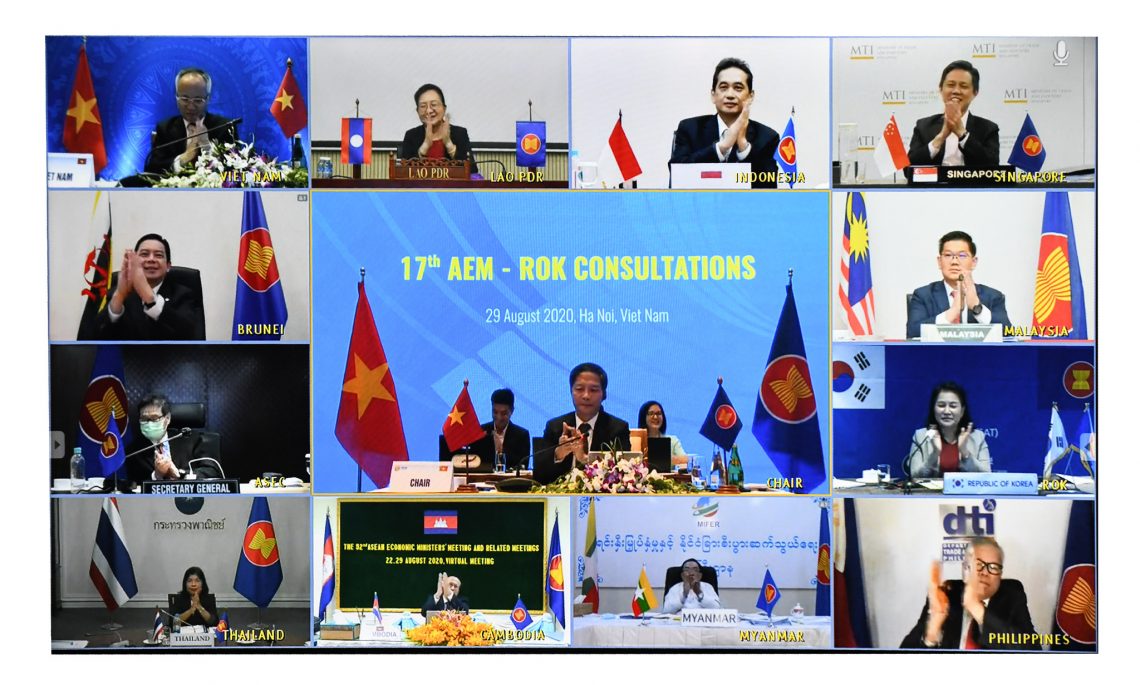1. Economic Ministers from the ten ASEAN Member States and the Republic of Korea (“the Ministers”) met virtually on 29 August 2020 on the occasion of the Seventeenth AEM-ROK Consultations. The Consultations were co-chaired by H.E. Tran Tuan Anh, Minister of Industry and Trade, Viet Nam and H.E. Ms. Yoo Myung Hee, Minister for Trade, Republic of Korea.
2. The Ministers acknowledged the impact of the unprecedented COVID-19 pandemic that has affected the lives of many people and economies in the region. The Ministers reaffirmed their commitment to take collective actions in mitigating the economic impact of the pandemic and resolved to ensure macroeconomic and financial stability by keeping the markets open for trade and investment and ensuring the supply chain connectivity, particularly ensuring the unimpeded flow of essential goods such as medical supplies, medicines and food in the region in accordance with the WTO rules and refraining from introducing or maintaining measures (i.e. of nontariff barriers) that could disrupt the flow of essential goods and services necessary to address the COVID-19 pandemic. The Ministers adopted the joint initiatives on bolstering the economic connectivity between ASEAN-ROK in response to the COVID19 outbreak, focusing on facilitating the flow of essential goods and service as well as essential movement of business people across borders. The Ministers also underscored the importance of coordinated efforts in promoting economic and social resilience in the region, including through the signing of the RCEP Agreement in 2020.
Download the full statement here.
- ABOUT ASEANThe Association of Southeast Asian Nations, or ASEAN, was established on 8 August 1967 in Bangkok, Thailand, with the signing of the ASEAN Declaration (Bangkok Declaration) by the Founding Fathers of ASEAN: Indonesia, Malaysia, Philippines, Singapore and Thailand. Brunei Darussalam joined ASEAN on 7 January 1984, followed by Viet Nam on 28 July 1995, Lao PDR and Myanmar on 23 July 1997, and Cambodia on 30 April 1999, making up what is today the ten Member States of ASEAN.Menu
- WHAT WE DO
ASEAN organs always strive to achieve ASEAN’s goals and objectives, the Secretary-General of ASEAN and the ASEAN Secretariat shall be functioned as coordinating Secretariat to help facilitate effective decision-making withing and amongst ASEAN bodies. In addition, each Member State shall appoint a Permanent Representative to liaise with Secretary-General of ASEAN and the ASEAN Secretariat
Menu - WHO WE WORK WITH
ASEAN shall develop friendly relations and mutually beneficial dialogues, cooperation and partnerships with countries and sub-regional, regional and international organisations and institutions. This includes external partners, ASEAN entities, human rights bodies, non-ASEAN Member States Ambassadors to ASEAN, ASEAN committees in third countries and international organisations, as well as international / regional organisations.
Menu - OUR COMMUNITIES
The rodmap for an ASEAN Community (2009-2015) was declared by the leaders in 2009. The ASEAN Community, anchored on three community pillars: Political-Security Community, Economic Community, Socio-Cultural Community was launched in 2015. The ASEAN 2025: Forging Ahead Together was introduced in 2015 as a Post-2015 Vision. It comprises the ASEAN Community Vision 2025, the ASEAN Political-Security Community Blueprint 2025, the ASEAN Economic Community Blueprint 2025 and the ASEAN Socio-Cultural Community Blueprint 2025
Menu - SITEMAP





